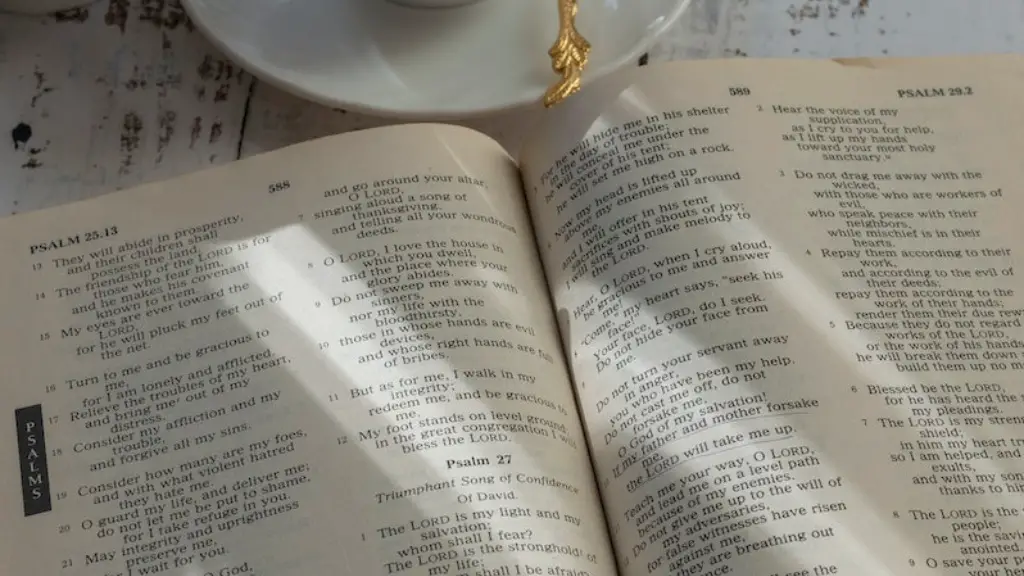Creating A Routine
Having a study routine and sticking to it is a great way to develop a habit of studying the Bible. To form a good routine, break up the Bible into easy-to-study sections and plan to cover each section in a certain amount of time. For example, dedicate 10 minutes to reading a specific chapter or passage each day. It’s also important to set aside time to create a study plan, track the progress made, and establish a strategy for what to focus on. Making a list of key concepts can help focus the study and keep it from veering off in too many directions. Establishing a specific schedule with flexibility built in can help make the study more consistent.
Staying Motivated
Studying the Bible can be difficult and tedious at times. Therefore, it’s important to stay motivated and think positively about the progress made. Establishing a reward system is a great way to keep yourself motivated. A reward system could be something like setting a goal for the week and rewarding yourself for completing the daily reading. Having a stationary reminder like a sticky note on the fridge or bathroom mirror can also help keep a person focused on the task.
Gaining New Insights
Study of the Bible should involve not just reading but also adding annotations and insights. Comparing notes with like-minded people and engaging in thoughtful discussions will not only help to clarify obscure points but will also provide a great learning experience. Reading commentaries from renowned theologians and biblical scholars can also provide valuable insights into the scriptures.
Growing In Knowledge
It’s important to use study tools that are appropriate for the task. It’s helpful to understand basic Bible study methods, principles, and hermeneutics. Try to challenge yourself by studying in a variety of ways, such as by reading devotionals or attending a Bible study group. While understanding the Bible in its original context can be beneficial, it’s also helpful to consider the application of the scriptures to modern times and the lessons that can be learned.
Choosing a Bible Translation
Choosing the right Bible translation is a key factor in studying the Bible. Different translations can have varying degrees of accuracy, so it is important to consider different ones. Many people prefer to read the Bible in its original languages, such As Hebrew and Greek. While this approach does require some translation, the original words and concepts can better be understood.
Making Connections
When studying the Bible, it’s important to make connections between the passages and concepts. For example, when reading about Jesus’s miracles, try to think about the parables and words of wisdom he taught and how they fit together. Going through the different stories from the Bible and drawing parallels between them can provide valuable insight.
Engaging In Prayer
Finally, engaging in prayer is an essential part of Bible study. Before beginning and after studying, it is important to bring concerns and questions to the Lord in prayer. This will help to bring a deeper understanding of the Scriptures and will help to gain insight into the truths that exist.
Pentateuch Overview
The Pentateuch is the first five books of the Bible and includes Genesis, Exodus, Leviticus, Numbers and Deuteronomy. Although Genesis is the first book, all five books contain much history and are often referred to together. The Pentateuch is the foundation of the Bible where the stories and histories of the Israelites are mainly told. It is the source for many of the Christian laws today. Studying the Pentateuch allows for insight about important issues such as Creation, the Covenant, and Salvation.
The Historical Books
The historical books of the Bible begin with Joshua and include Judges, Ruth, 1 and 2 Samuel, 1 and 2 Kings, 1 and 2 Chronicles, Ezra, Nehemiah, and Esther. These books provide an overview of the major events in the history of the Israelites. They also include stories of individual characters and the trials and successes that they experienced. Studying these books can provide a better understanding of the Israelites as a people and how God interacted with them during their history.
The Poetic Books
The poetic books of the Bible include Job, Psalms, Proverbs, Ecclesiastes, and Song of Solomon. These books are the source of many of the most well-known verses and provide practical advice on how to apply the wisdom of God in daily life. By studying these books, we can gain insight into the utterances of the wise and the foolish and the importance of living a reflective and prayerful life.
The Prophetic Books
The prophetic books include Isaiah, Jeremiah, Lamentations, Ezekiel and the Minor Prophets, which includes Hosea, Joel, Amos, Obadiah, Jonah, Micah, Nahum, Habakkuk, Zephaniah, Haggai, Zechariah, and Malachi. These books are the source of many of the prophecies made by the prophets and foreshadowings of the coming Messiah. Studying these books provides insight into the relationships between God and humanity and how God works in the world.
Practical Bible Study
When beginning Bible study, it is important to establish a routine and use a variety of tools and techniques. Utilizing study aids such as commentaries, Bible studies, and online seminars can provide invaluable insights into the scriptures. It’s also essential to engage in prayer along with Bible study in order to access a deeper understanding of the truth. Lastly, using tools such as the Pentateuch, Historical Books, Poetic Books, and Prophetic Books to familiarize oneself with the Bible can provide a solid foundation of knowledge that will last a lifetime.



